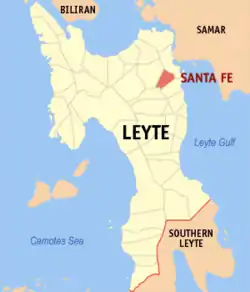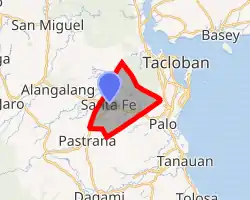Santa Fe, Leyte
Santa Fe, officially the Municipality of Santa Fe (Waray: Bungto han Santa Fe; Tagalog: Bayan ng Santa Fe), is a 5th class municipality in the province of Leyte, Philippines. According to the 2015 census, it has a population of 20,439 people. [3]
Santa Fe | |
|---|---|
| Municipality of Santa Fe | |
 Seal | |
 Map of Leyte with Santa Fe highlighted | |
OpenStreetMap 
| |
.svg.png.webp) Santa Fe Location within the Philippines | |
| Coordinates: 11°11′08″N 124°54′58″E | |
| Country | |
| Region | Eastern Visayas (Region VIII) |
| Province | Leyte |
| District | 1st District |
| Barangays | 20 (see Barangays) |
| Government | |
| • Type | Sangguniang Bayan |
| • Mayor | Amparo H. Monteza |
| • Vice Mayor | Ismael V. Lantajo |
| • Representative | Ferdinand Martin G. Romualdez |
| • Councilors | List
|
| • Electorate | 14,246 voters (2019) |
| Area | |
| • Total | 53.97 km2 (20.84 sq mi) |
| Elevation | 29 m (95 ft) |
| Population | |
| • Total | 20,439 |
| • Density | 380/km2 (980/sq mi) |
| • Households | 4,720 |
| Economy | |
| • Income class | 5th municipal income class |
| • Poverty incidence | 33.59% (2015)[4] |
| • Revenue | ₱56,921,144.95 (2016) |
| Time zone | UTC+8 (PST) |
| ZIP code | 6513 |
| PSGC | |
| IDD : area code | +63 (0)53 |
| Climate type | tropical rainforest climate |
| Native languages | Waray Tagalog |
Geography
Barangays
Santa Fe is politically subdivided into 20 barangays. [2]
- Baculanad
- Badiangay
- Bulod
- Catoogan
- Katipunan (formerly the sitio of Pinanhadsan[5])
- Milagrosa (formerly the sitio of Km. 17[5])
- Pilit
- Pitogo
- Zone 1 (Poblacion)
- Zone 2 (Poblacion)
- Zone 3 (Poblacion)
- San Isidro
- San Juan
- San Miguelay
- San Roque (formerly Curba[6])
- Tibak
- Victoria
- Cutay
- Gapas
- Zone 4 Poblacion (Cabangcalan)
Climate
| Climate data for Santa Fe, Leyte | |||||||||||||
|---|---|---|---|---|---|---|---|---|---|---|---|---|---|
| Month | Jan | Feb | Mar | Apr | May | Jun | Jul | Aug | Sep | Oct | Nov | Dec | Year |
| Average high °C (°F) | 28 (82) |
28 (82) |
29 (84) |
31 (88) |
31 (88) |
31 (88) |
30 (86) |
30 (86) |
30 (86) |
29 (84) |
29 (84) |
28 (82) |
30 (85) |
| Average low °C (°F) | 23 (73) |
23 (73) |
23 (73) |
24 (75) |
24 (75) |
25 (77) |
24 (75) |
24 (75) |
24 (75) |
24 (75) |
24 (75) |
23 (73) |
24 (75) |
| Average precipitation mm (inches) | 98 (3.9) |
82 (3.2) |
96 (3.8) |
71 (2.8) |
104 (4.1) |
129 (5.1) |
101 (4.0) |
94 (3.7) |
99 (3.9) |
135 (5.3) |
174 (6.9) |
143 (5.6) |
1,326 (52.3) |
| Average rainy days | 18.0 | 14.1 | 17.1 | 16.8 | 23.7 | 25.7 | 25.8 | 23.3 | 24.2 | 25.9 | 24.0 | 20.6 | 259.2 |
| Source: Meteoblue [7] | |||||||||||||
History
About thirty years ago, Santa Fe was just one of the biggest barrios of Palo, Leyte. In 1948, Juan R. Perez, a native of this barrio, was a private secretary. Inspired and prompted by Melquiades Almen, Julian Dagami, Jose Catada, Antonio Evalo, Eulogio Navarra and Maximo Postreto, all civic leaders and with the consent of Mayor Generoso Alvarado of Palo, House Bill No. 1918 was drafted and sponsored on May 6, 1948 on the floor of the House of Representatives by Congressman Perez, creating Santa Fe a town. At first there was strong opposition from the residents of Palo as Santa Fe and other affected barrios were the main source of income for the town but the oppositionist were silenced by the budding leaders of Santa Fe. The bill was finally approved by the lower house and the Senate under the leadership of Senator Jose Avelino. However, politics intervened. While the bill was waiting for the signature of President Elpidio Quirino, there was a split of the party in power.
Although President Quirino was the logical candidate for election, many leaders believed that Senate President Jose Avelino was the apparent successor to the presidency. Don Pio Pedrosa, then Secretary of Finance in the Cabinet of President Quirino was commissioned to sound out the political sentiments of the people of Santa Fe in that presidential election. His objective in visiting Santa Fe was to unite the leaders there so that it would be easy for him to secure approval of the bill pending the signature of President Quirino converting Santa Fe into a town. Those supporting the administration met Sec. Pedrosa in the old Martinez residence. Atty. Carlos Martinez was the leader of this group. Those supporting Senate President Jose Avelino, under the leadership of the private secretary of Congressman Juan Perez met Sec. Pedrosa in the public victory in the entire country. The bill creating Santa Fe into a town was vetoed. However, the yearnings, dreams and aspirations of this ambitious barrio was not to be denied for long. Smarting from the bitter lesson of disunity, fresh efforts were exerted to renew the campaign with more enthusiasm to convince the powers that Santa Fe should be made a free and independent town from Palo, in the name of progress. At this point, the warring political factions of the town were strongly united and determined to overcome all obstacles along the way. Under the guidance of Santa Ana, the patroness of this barrio, Don Pio Pedrosa forgave those who did not follow him in that presidential election. Upon his strong recommendation, President Quirino, by Executive Order No. 277 dated October 10, 1949, created Santa Fe, together with Tunga and Julita as new towns of Leyte.
Santa Fe was then born as a free and independent town by presidential fiat and notably legislative action. On the eve of its traditional town fiesta, the residents under the leadership of Mayor Iluminado Martinez, one of the first councilors of Santa Fe in 1949 and dynamic parish priest Rev. Father Antonio Adre, in grateful remembrance and recognition, saluted the efforts of those who led in making Santa Fe a town out of several barrios of Palo. Its fertile fields and valleys abound with corn, camote and other root crops, while its rivers Kasili-on and Maslog are rich with fish, adequate in quantity to give food and sustenance to its ever-increasing population. The BANCOM projects in its northern periphery promises to be the rice granary of the town. Today there are 15 barangays in Santa Fe with an area of 5,567 hectares irrigated and planted with rice.[8]
Demographics
|
| ||||||||||||||||||||||||||||||
| Source: Philippine Statistics Authority [3] [9] [10][11] | |||||||||||||||||||||||||||||||
In the 2015 census, the population of Santa Fe, Leyte, was 20,439 people, [3] with a density of 380 inhabitants per square kilometre or 980 inhabitants per square mile.
Education
There are a total of 17 elementary schools and 2 high schools in Santa Fe Leyte [12]
Elementary/Grade School
- Baculanad Elementary School
- Badiangay Elementary School
- Bulod Elementary School
- Catoogan Elementary School
- Cutay Elementary School
- Gapas Elementary School
- Katipunan Elementary School
- Milagrosa Elementary School
- Pilit Elementary School
- Pitogo Elementary School
- San Isidro Elementary School
- San Juan Elementary School
- San Miguelay Elementary School
- San Roque Elementary School
- Santa Fe CS
- Tibak Elementary School
- Victoria Elementary School
High School/Secondary Schools
- Santa Fe National High School
- Santa Fe Stand-alone Senior High School
References
- Municipality of Santa Fe | (DILG)
- "Province: Leyte". PSGC Interactive. Quezon City, Philippines: Philippine Statistics Authority. Retrieved 12 November 2016.
- Census of Population (2015). "Region VIII (Eastern Visayas)". Total Population by Province, City, Municipality and Barangay. PSA. Retrieved 20 June 2016.
- "PSA releases the 2015 Municipal and City Level Poverty Estimates". Quezon City, Philippines. Retrieved 12 October 2019.
- "An Act Converting the Sitios of Pinanhadsan and Km. 17, Municipality of Santa Fe, Province of Leyte, into Barrios of Said Municipality to Be Known As the Barrios of Katipunan and Milagrosa, Respectively". LawPH.com. Retrieved 2011-04-12.
- "An Act Changing the Name of the Barrio of Curba, Municipality of Santa Fe, Province of Leyte, to Barrio San Roque". LawPH.com. Retrieved 2011-04-12.
- "Santa Fe: Average Temperatures and Rainfall". Meteoblue. Retrieved 29 February 2020.
- "History of Santa Fe, Leyte". STAFELEYTE. 2016-09-23. Retrieved November 5, 2018.
- Census of Population and Housing (2010). "Region VIII (Eastern Visayas)". Total Population by Province, City, Municipality and Barangay. NSO. Retrieved 29 June 2016.
- Censuses of Population (1903–2007). "Region VIII (Eastern Visayas)". Table 1. Population Enumerated in Various Censuses by Province/Highly Urbanized City: 1903 to 2007. NSO.
- "Province of Leyte". Municipality Population Data. Local Water Utilities Administration Research Division. Retrieved 17 December 2016.
- . School Torkis Directory https://schools.trokis.com. Retrieved November 6, 2018. Missing or empty
|title=(help)